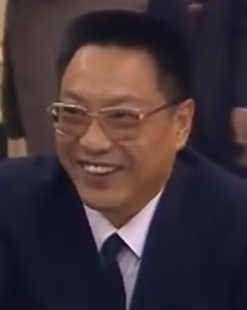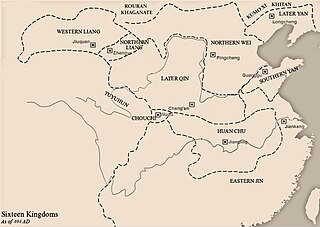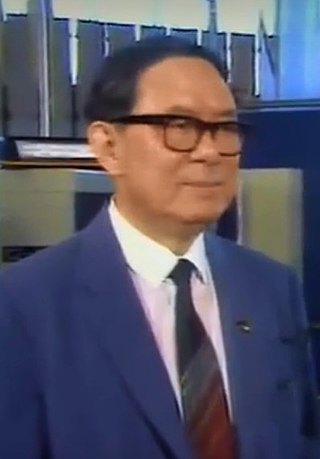Related Research Articles

Deng Pufang is a Chinese politician, who is the eldest son of former Chinese paramount leader Deng Xiaoping. He is mostly known for being injured during the Cultural Revolution by the Red Guards and becoming a paraplegic. He has since dedicated his life to improving the rights of people with disabilities.

Qin, known as the Former Qin and Fu Qin (苻秦) in historiography, was a dynastic state of China ruled by the Fu (Pu) clan of the Di peoples during the Sixteen Kingdoms period. Founded in the wake of the Later Zhao dynasty's collapse in 351, it completed the unification of northern China in 376 during the reign of Fu Jiān, being the only state of the Sixteen Kingdoms to achieve so. Its capital was Chang'an up to Fu Jiān's death in 385. The prefix "Former" is used to distinguish it from the Later Qin and Western Qin dynasties that were founded later.
Deng Yaping is a Chinese table tennis player, who won eighteen world championships including four Olympic championships between 1989 and 1997. She is regarded as one of the greatest players in the history of the sport.

Qin, known in historiography as the Later Qin or Yao Qin (姚秦), was a dynastic state of China ruled by the Yao clan of Qiang ethnicity during the Sixteen Kingdoms period in northern China. As the only Qiang-led state among the Sixteen Kingdoms, it was most known for its propagation of Buddhism under its second ruler, Yao Xing, who sponsored the Madhyamakin monk, Kumārajīva to translate Sanskrit Buddhist text into Chinese.

The People's Republic of China competed at the 2000 Summer Olympics in Sydney, Australia. The team excluded athletes from the Special Administrative Region of Hong Kong, after the territory's return to Chinese rule in 1997, and which competed separately as Hong Kong, China.

Yao Chang, courtesy name Jingmao (景茂), also known by his posthumous name as the Emperor Wuzhao of Later Qin (後秦武昭帝), was the founding emperor of the Qiang-led Chinese Later Qin dynasty. His father Yao Yizhong had been a powerful general and Qiang chieftain under the Later Zhao emperor Shi Hu, but after Later Zhao's collapse after Shi Hu's death, Yao Chang's older brother Yao Xiang tried to start an independent state but was defeated and killed by Former Qin forces. Yao Chang became a Former Qin general, but after an incident in 384 after the Former Qin emperor Fu Jiān's defeat at the Battle of Fei River, Yao Chang feared that Fu Jiān would kill him and therefore rebelled. He subsequently captured and killed Fu Jiān, who had saved his life when Yao Xiang was defeated, causing many historians to view him as a traitor and murderer.
Fu Deng, courtesy name Wengao (文高), also known by his posthumous name as the Emperor Gao of Former Qin (前秦高帝), was an emperor of the Di-led Chinese Former Qin dynasty. He assumed the throne in 386 after the deaths of Fu Jiān and Fu Jiān's son Fu Pi, even though he was only a distant relative of theirs, as by that time the Former Qin's territory had largely been reduced to the territory under his control. He battled the Later Qin emperor Yao Chang for years in a stalemate that neither could conclusively prevail, but in 394, he made a major attack on Later Qin after Yao Chang's death, seriously underestimating Yao Chang's son and successor Yao Xing, who captured and executed him. Later that year, his son Fu Chong, who succeeded him, would die in battle, ending the Former Qin dynasty.

Bao Tong was a Chinese writer and activist. He was Director of the Office of Political Reform of the Central Committee of the Chinese Communist Party (CCP) and the Policy Secretary of Zhao Ziyang. He was also Director of the Drafting Committee for the CCP 13th Party Congresses, known for its strong support of market reform and opening up under Deng Xiaoping. Prior to this, he was a committee member and then deputy director of the Chinese State Commission for Economic Reform. During the 1989 Tian’anmen square protests, he was one of the very few Chinese senior officials to express understandings with the demonstrating students, which led to his arrest shortly before the June Fourth incident.
Yin Jian is a double Olympic medal winning Chinese sailor, in women's windsurfing.

Deng Linlin, is a Chinese retired gymnast. She was a member of the Chinese team that won the team gold medal at the 2008 Olympic Games in Beijing, People's Republic of China, and is a three-time World Cup gold medalist. She is the 2009 World and 2012 Olympic champion on balance beam.
Events in the year 1979 in the People's Republic of China.

Justice Bao is a Chinese TV series starring producer Jin Chao-chun as the Song dynasty official Bao Zheng. The series ran for 3 seasons from 2010 to 2012. In addition to Jin, Kenny Ho, Fan Hung-hsuan and Lung Lung again reprise their iconic roles from the 1993 Taiwanese hit Justice Pao and the 2008 Chinese series Justice Bao.
Andres Olvik is an Estonian swimmer, who specialized in backstroke events. He represented his nation Estonia at the 2008 Summer Olympics, and has won two gold medals in a backstroke double at the 2011 Baltic Championships in Riga, Latvia. Apart from his medal treasury, he also set a long-course Estonian record in the 200 m backstroke (2:02.67) at the 2012 European Championships in Debrecen, Hungary. Olvik currently trains for the Estonian national team, while coaching numerous age groups at Kalev Swim School in Tallinn.
Kong Que Ling is a Chinese television series adapted from Gu Long's Qizhong Wuqi novel series. It was first broadcast on CCTV-1 on 2 January 2011. It added a heavy dose of supernatural mysticism into the traditional wuxia story.
Counterattack the Right-Deviationist Reversal-of-Verdicts Trend (反击右倾翻案风), later known as Criticize Deng, Counterattack the Right-Deviationist Reversal-of-Verdicts Trend (批邓、反击右倾翻案风), was a Chinese political campaign launched by The Gang Of Four in November 1975 against Deng Xiaoping's anti-Cultural Revolution program. It was one of the last movements during the Cultural Revolution, and continued briefly under Hua Guofeng after Mao's 1976 death, before it officially ended with Deng's rehabilitation in July 1977.
Neoauthoritarianism, also known as Chinese Neoconservativism or New Conservatism since the 1990s, is a current of political thought within the People's Republic of China (PRC), and to some extent the Chinese Communist Party (CCP), that advocates a powerful state to facilitate market reforms. It has been described as right-wing, classically conservative even if elaborated in self-proclaimed "Marxist" theory.

Song Jian is a Chinese aerospace engineer, demographer, and politician. He was deputy chief designer of China's submarine-launched ballistic missile (JL-1) and one of the country's leading scientists in the post-Cultural Revolution era. After a decade of two-child restrictions in the 1970s, and following the Chinese government's announcement in 1979 to advocate for one child per family, he became a leading advocate for rapid implementation and broad coverage of China's one-child policy. He served in high-ranking political positions including Vice Minister of Aerospace Industry, Director of the State Science and Technology Commission (1985–1998), vice-premier-level State Councillor (1986–1998), President of the Chinese Academy of Engineering, Vice Chairperson of the Chinese People's Political Consultative Conference, and a member of the Central Committee of the Chinese Communist Party.
Investiture of the Gods is a 2019 Chinese shenmo television series loosely based on the 16th-century Chinese gods and demons fiction Investiture of the Gods by Xu Zhonglin and Lu Xixing. The series is directed by Korean director Shin Woo-chul and starring Wang Likun, Luo Jin, Zhang Bo, Yu Hewei, Deng Lun, and Collin Chou. Produced by Mango Studio, Cathay Media Group, China Television Production Center and China Central Television (CCTV), Investiture of the Gods aired on Hunan Television in April 2019. The series followed the love story between Erlang Shen and Daji in the two rival countries Shang and Western Zhou.
The China men's national artistic gymnastics team represents China in FIG international competitions.